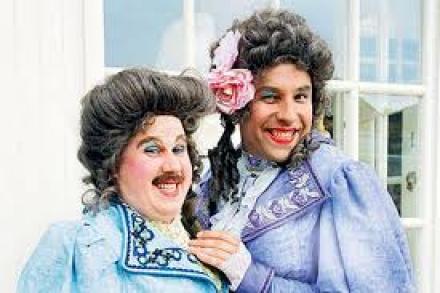
RD: Matt, you make a grand entrance as Andy, who has escaped from his wheelchair and is swinging above the stage on a wire. Was that scary?
Lucas: Crossing the road is frightening to me, but up there I never felt scared. People bought their tickets a year in advance and we wanted to give them something spectacular. The real feats are the costume changes – me trying to get from mail-order bride Ting Tong’s miniskirt into Vicky Pollard’s skin-tight tracksuit in 25 seconds.
RD: Do you have favourite characters?
Walliams: I like anyone in dresses. I love playing Carol, the “computer says no" woman, because she is so inactive. After running around for the rest of the show, it gives me a chance of a sit-down. I also like Lou because there’s pathos there. Emily Howard, the rubbish transvestite, is fun but there’s no depth. I’d like to let her go at some point, but Lou I’d be happy playing in 20 years.
Lucas: As Fat Fighter Marjorie Dawes, I can interact with the audience, tease people in the front row. For me, that’s when the show really comes alive.
RD: You’ve been performing since your teens. Did you always want to become comedians?
Walliams: I got a laugh when I was in a play aged ten and it made me feel important. From then on, I’d do things like getting teachers onstage during assemblies and putting custard pies in their faces. Making people laugh gave me pleasure, so I always thought, Let’s see where this one leads me.
Lucas: I’d record A Bit of Fry and Laurie on a cassette player and learn the routines, but I didn’t dare dream of doing anything like stand-up because of the way I looked. (Lucas went bald with shock, aged six, after being hit by a car.) Then I met David and he started doing spots at comedy clubs. It gave me confidence that there was someone I knew working on the stand-up circuit.
RD: Who were your comedy influences?
Walliams: Obviously we’re in the same tradition as camp characters from the 1970s like Dick Emery’s Clarence and Mr Hargreaves from Are You Being Served? But comedians always choose dead people to answer this question. I also learnt a lot about timing and joke construction from Rowan Atkinson and Monty Python. And Matt and I love Ricky Gervais, The League of Gentlemen and Catherine Tate.
 Lucas: When I first saw Vic Reeves Big Night Out in 1990, I felt as if it was all written for me. It was like, How did you know that would make me laugh? That was my big turning point.
Lucas: When I first saw Vic Reeves Big Night Out in 1990, I felt as if it was all written for me. It was like, How did you know that would make me laugh? That was my big turning point.
RD: You were in a lot of shows before you struck gold with Little Britain. Were you surprised by its success?
Lucas: I was totally shocked. For the first eight years of working with David, we were just jobbing comics. We did a series for BBC2 in 1999 called Sir Bernard’s Stately Homes, but it wasn’t good enough and we thought our moment had passed. When we first started doing Little Britain, we thought it was too rude for TV. I was amazed to get on BBC3, amazed to be recommissioned and amazed to go to BBC1.
Walliams: The timing was lucky. The Fast Show and The League of Gentlemen had finished, so viewers were ready for something new. We got the packaging right: the music, the title, Tom Baker’s narration. And the media helped. Whenever they write about single mums or teenage criminals, they use a picture of Vicky Pollard. You can’t legislate for publicity like that.
Read more of the interview here



